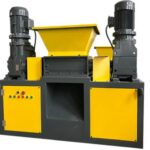The Urgent Need to Address E-Waste: A Growing Environmental Crisis
Growing e-waste Crisis In today’s consumer-driven society, technology has become an integral part of our lives. From smartphones to laptops, we are constantly upgrading and replacing our electronic devices. However, the rapid pace of technological advancements has a hidden cost – the generation of electronic waste, also known as e-waste.
E-waste encompasses a wide range of discarded electronic devices
computers, smartphones, televisions, and various household appliances. As these devices become obsolete or damaged, they often end up in landfills or are illegally dumped in developing countries. This alarming trend has serious consequences for the environment and human health, making it a pressing issue that demands immediate attention.
One of the primary concerns surrounding e-waste is its toxic impact on the environment. Visit https://goldenrecycling.org for more Infos! Electronic devices contain hazardous materials such as lead, mercury, cadmium, and flame retardants, which can pollute soil, water, and air when improperly disposed of. These toxins seep into the ecosystem, contaminating natural resources and posing a risk to both wildlife and humans. For example, when electronic waste is burned, it releases toxic fumes, contributing to air pollution and respiratory diseases.
Another significant issue with e-waste is the inefficient use of finite resources.
Production of electronic devices requires the extraction of precious metals and rare earth elements, which are scarce and non-renewable. By discarding these devices without proper recycling, we squander the opportunity to recover valuable materials. Recycling e-waste not only conserves resources but also reduces the environmental impact of mining and extraction processes.
Furthermore, the social implications of e-waste cannot be ignored. Many developing countries, particularly in Africa and Asia, have become destinations for the illegal disposal of e-waste. These practices have severe consequences for the local communities, exposing them to health risks and pollution without providing any economic benefits. The lack of proper regulations and infrastructure to handle e-waste exacerbates the problem, making it essential for governments and organizations to take immediate action.
To address the growing e-waste crisis,
governments, manufacturers, and consumers need to collaborate and implement sustainable solutions. Here are a few key steps that can be taken:
Implement proper e-waste recycling programs: Governments should establish and enforce regulations to ensure the proper disposal and recycling of electronic devices. Manufacturers should also be responsible for creating products that are easier to recycle and ensuring the availability of recycling services.
Educate and raise awareness: Consumers should be informed about the environmental impact of e-waste and encouraged to choose environmentally friendly products. Education campaigns can highlight the importance of recycling and provide accessible avenues for disposal.
Encourage product longevity and repairability: Manufacturers can contribute to reducing e-waste by designing products that are durable, upgradable, and repairable. This approach promotes a circular economy, where devices are used for longer periods and components can be easily replaced or upgraded.
Support responsible recycling practices: Consumers should be encouraged to recycle their electronic devices properly. This can be facilitated by setting up collection centers and e-waste drop-off points in communities, making it convenient for individuals to participate in recycling initiatives.
Promote alternative consumption models: Encouraging the utilization of services such as product leasing or subscription models can reduce the demand for constant upgrading and discarding of electronic devices. This shift towards a more sustainable approach can help minimize e-waste generation.
The e-waste crisis is not an insurmountable challenge, but it requires collective action and commitment from all stakeholders. By prioritizing responsible consumption, recycling, and sustainable design, we can mitigate the adverse effects of e-waste on our environment and create a more sustainable future for generations to come.
Together, we can pave the way towards a society that values the proper disposal of electronic waste, preserves valuable resources, and protects our planet. Let’s take action now, before it’s too late.











20 responses to “e-waste Crisis”
Thank you for information, when you show how much you make of the RAM ?
Usually I do not read article on blogs however I would like to say that this writeup very compelled me to take a look at and do so Your writing taste has been amazed me Thanks quite nice post
Thank you for sharing your personal experiences and stories It takes courage to open up and you do it with such grace and authenticity
You are in point of fact a good webmaster. The website loading
pace is amazing. It sort of feels that you’re doing any
distinctive trick. Also, the contents are masterpiece. you’ve performed a wonderful process in this topic!
Similar here: ecommerce
and also here: Tani sklep
This is exactly what I needed to read today Your words have provided me with much-needed reassurance and comfort
Your posts always provide me with a new perspective and encourage me to look at things differently Thank you for broadening my horizons
We can offer electric waste servers computers laptops and Flatscreen in Tirana please contact us more info thank
how can we buy the CPU and IC removal machine. From where you Send it ? Please send me eemail . also good article thank you
great article! We are interessted in buying several Machines for our recycling Operations in Northern America. We offer Tons of Shredded HDD and Shredded PCBa get in touch with us!
we offer quick quotes on ewaste in Australia, we buy sell and trade your ewaste. Contact us
we are ewaste recyclers based in mexico. looking for buyers worldwide ! Contact us
WE OFFER CHEAP SERVERS AND SECOND HAND COMPUTERS !!!! GET IN TOUCH WITH US
can we forward you our ewaste by courier ?
goldenrecycling very popular this time good
We offer accessories and equipment for Gold Refining, Silver Refining, Precious metal Smelting and more, btw i liked your article
we offer great ewaste prices in the US contact us
we offer good Prices for Aluminum and Copper contact us for cooperatiomn
Thank you for Article interessting red
we have big stock of second Hand Tablets here in UK, working and no working. Contact us if ou are interessted in buy
awesome Article, wnna ready more added you to my Favorites ;)))